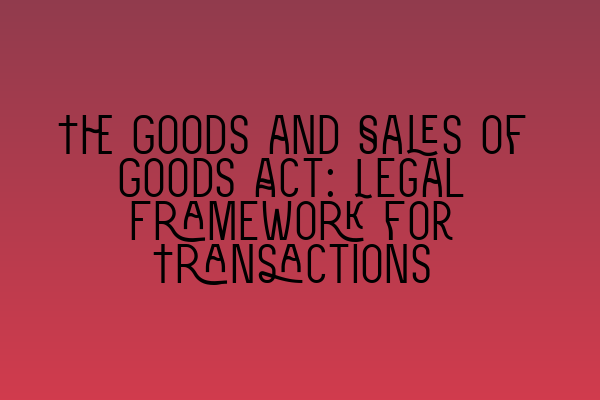The Goods and Sales of Goods Act: Legal Framework for Transactions
When engaging in commercial transactions, it is crucial to have a solid understanding of the legal framework that governs the sale of goods. The Goods and Sales of Goods Act (SOGA) is the cornerstone of contract law in this area, providing businesses and consumers with rights and remedies in their transactions. In this article, we will explore the key aspects of the SOGA and its implications for buyers and sellers.
Overview of the Goods and Sales of Goods Act
The SOGA is a statutory provision that regulates the sale of goods in England and Wales. It sets out the rights and responsibilities of both buyers and sellers in commercial transactions, ensuring fairness and certainty in business dealings. The Act covers a wide range of transactions, including the sale of tangible goods, such as machinery, furniture, and vehicles.
The Formation of a Contract
Under the SOGA, a contract for the sale of goods can be formed through various means, including verbal agreements, written contracts, or even conduct. However, it is always advisable to have a written contract in place to avoid any disputes or misunderstandings. The contract must include essential terms, such as the identification of the goods, price, delivery terms, and payment terms.
It is important to note that the SOGA applies to both business-to-business (B2B) transactions and business-to-consumer (B2C) transactions. In B2B transactions, parties have more flexibility in negotiating contractual terms, while B2C transactions offer greater protection to consumers.
Implied Terms
The SOGA includes a number of implied terms that are automatically incorporated into a contract unless expressly excluded by the parties. These terms are important as they provide a level of protection and ensure that buyers receive goods that meet certain standards of quality and fitness for purpose.
One of the key implied terms under the SOGA is that goods must be of satisfactory quality. This means that goods should be fit for their intended purpose, free from defects, and reasonably durable. If the goods do not meet these standards, the buyer has the right to reject them and seek remedies, such as a full refund or a replacement.
Another important implied term is that goods must be as described by the seller. If the goods do not match the description provided, the buyer can seek remedies for misrepresentation.
Remedies for Breach of Contract
If there is a breach of contract, the SOGA provides various remedies for both buyers and sellers. These remedies aim to compensate the injured party and restore them to the position they would have been in if the contract had been performed correctly.
For buyers, the main remedies include:
- Rejection of the goods
- Repair or replacement of the goods
- Price reduction
- Rescission of the contract
- Damages for any loss suffered
For sellers, the remedies may include:
- Suing for the price of the goods
- Rescission of the contract
- Claiming damages for any loss suffered
It is important to note that remedies may vary depending on the circumstances of each case, and the court will consider factors such as the nature of the breach and the impact on the innocent party.
Conclusion
The Goods and Sales of Goods Act is an essential legal framework for transactions involving the sale of goods. It sets out the rights and responsibilities of buyers and sellers, ensuring fairness and certainty in commercial dealings. By understanding the key provisions of the SOGA, businesses and consumers can protect their interests and seek remedies in case of any breach of contract.
To deepen your understanding of contract law and prepare for the SQE exam, check out our related articles:
